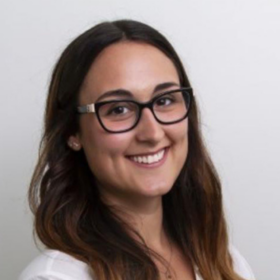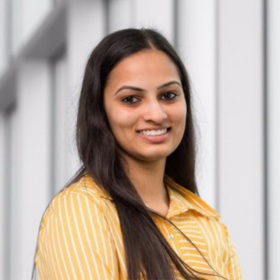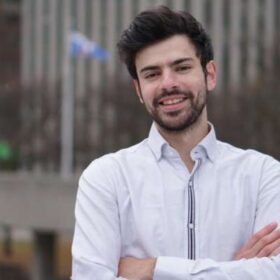
Kavya Divakarla is determined to play a leading role in the future of electric and robotic vehicles, and it’s very likely she will. In fact, the 25-year-old PhD student is a prime example of the kind of success students can realize when they work hard, make the most of their co-op placements, showcase their skills often and elevate the right connections.
After completing high school in Toronto, Divakarla began her post-secondary education in McMaster’s Bachelor of Technology (BTech) degree program. “I was particularly attracted to the hands-on learning and the competitive co-op experience,” she says. “[I thought] the unique combination of engineering and management would provide me with a competitive advantage in the workforce.”
She quickly rose to the top of her class during her undergrad tenure, where she specialized in Automation Engineering Technology, and received three scholarships, including the International Society of Automation Scholarship, the Canadian Process Control Association Scholarship and the University Senate Scholarship.
Divakarla says she’s been able to scale the academic ladder so efficiently because she hasn’t taken any time off. She completed multiple co-ops and work terms at Ontario Power Generation, ASCO Power Technologies (otherwise known as Emerson Network Power), and as a Research Assistant in McMaster’s Department of Civil Engineering. “Every summer, every co-op slot, I was doing something,” she says. “I’ve always been working.”
Her last position proved particularly fruitful, as it led to her acceptance into her choice Master’s program in Electrical and Computer Engineering at McMaster University. She received the prestigious Ontario Graduate Scholarship (OGS) in 2012 and the Natural Sciences and Engineering Research Council of Canada (NSERC) scholarship in 2013, both of which she credits almost wholly to the guidance, support and glowing references she received from her BTech. profs. “Very few people actually receive [these scholarships],” she says. “My BTech profs [and experience in the program] helped a lot.”
Today, Divakarla is at the forefront of autonomous and hybrid electric vehicle innovation. She’s completing a PhD in Electrical and Computer Engineering; she’s part of the Canada Excellence Research Chair in the Hybrid Powertrain; and the McMaster Institute for Automotive Research and Technology (MacAUTO), one of the largest and leading institutes in academia for transportation electrification. She’s also the Secretary and Membership Development Chair in the executive committee of IEEE Hamilton, where she says she gets to apply the valuable leadership skills she acquired in her undergrad program to the role. “BTech is simply a program that’s made for leaders,” she says.
Speaking of which, Divakarla hopes to take on a corporate leadership role herself in the next few years – she’s currently employed as a Functional Safety Engineer, specializing in Advanced Driver Assistance Systems (ADAS), with Fiat Chrysler. But she won’t leave academia far behind: “I want to contribute back,” she says. “And it’s crucial to stay in touch with academia because that’s where new research and development is happening.” With minds like hers, you can bet that’s true.



